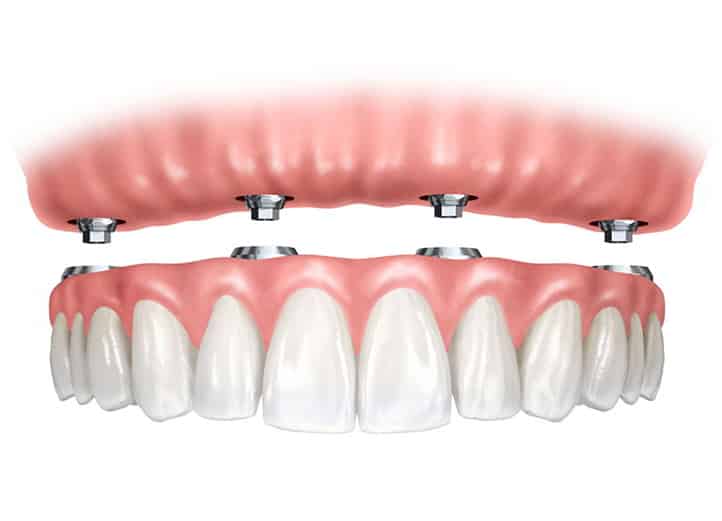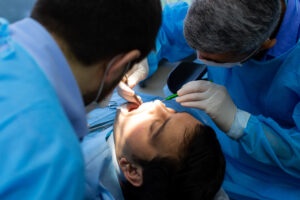All-on-4 dental implants help people who have lost most or all of their teeth. This method uses four implants placed in your jawbone to hold a full set of replacement teeth. The treatment gives you better chewing and speaking abilities while creating a natural-looking smile. Some risks exist, like infection or implant problems, but good bone health and good oral hygiene improve your chances of success. The process starts with a check-up, removes bad teeth if needed, and uses temporary teeth while you heal. You can find this advanced treatment at any leading dental clinic.
Understanding All-on-4 Dental Implants
All-on-4 dental implants offer a smart way to replace missing teeth with a fixed full set of new teeth. This method uses four dental implants placed into your jawbone to hold a custom-made dental bridge. All-on-4 implants give you a stable and long-lasting answer if you’re missing many teeth or have no teeth left. Dentists place the implants at special angles so even people with less bone can get this treatment without needing bone grafts. You usually need only one surgery, making it faster than regular implant methods. With good care, All-on-4 dental implants can give back your ability to eat, smile, and feel confident again.
Benefits of All-on-4 Implants
All-on-4 dental implants bring many advantages that can greatly improve your life when you need to replace all your teeth. One big benefit is the shorter treatment time compared to regular implant methods. With All-on-4, you can often get a complete set of new teeth in just one surgery visit, which means faster healing and quicker return to normal eating. This method costs less money since you need fewer implants. The All-on-4 method also gives better stability and strength, letting you chew and speak more easily. The results look great too, giving you a natural-looking smile that builds confidence and makes you feel better overall.
Risks and Considerations
You should know about possible risks and important factors when deciding if All-on-4 dental implants are right for your dental needs. While All-on-4 implants have many benefits, such as improved aesthetics and function, there are risks to know about. These include possible infection, nerve damage, or implant problems. Factors such as bone thickness, overall health, and how well you clean your teeth can affect how well the treatment works. Talk with your dentist about any health problems you have and follow all care instructions after surgery. Knowing these risks and factors will help you decide if All-on-4 dental implants are the best choice for fixing your smile.
All-on-4 Procedure Overview
Here’s what happens during the All-on-4 dental implant procedure, showing the main steps in this modern treatment for restoring your smile. The All-on-4 procedure puts four dental implants in your jawbone to hold a full set of teeth. First, your dentist does a complete check-up to see if your mouth is healthy enough for treatment. Next, they remove any bad teeth that need to come out, then place implants at special angles to get the best stability and bone support. Once the implants are firmly in place, they attach temporary teeth. After your mouth heals, they put on permanent, custom-made teeth that look natural and work well.
Aftercare and Maintenance
Taking good care of your All-on-4 dental implants is important to keep them working well and looking good for many years. Good aftercare helps make sure your dental implant treatment succeeds. Here are four key steps to help you take care of your All-on-4 implants:
- Oral Hygiene: Brush your teeth at least twice a day and floss daily to prevent plaque from accumulating around the implants.
- Regular Dental Check-ups: Visit your dentist regularly for professional cleanings and to check that your implants stay healthy.
- Avoid Hard Foods: Stay away from tough or sticky foods that could damage the implants or hurt your gums.
- Quit Smoking: Smoking can slow down healing and make implant problems more likely. Stop smoking to help your All-on-4 dental implants last longer.
Related Topics:






